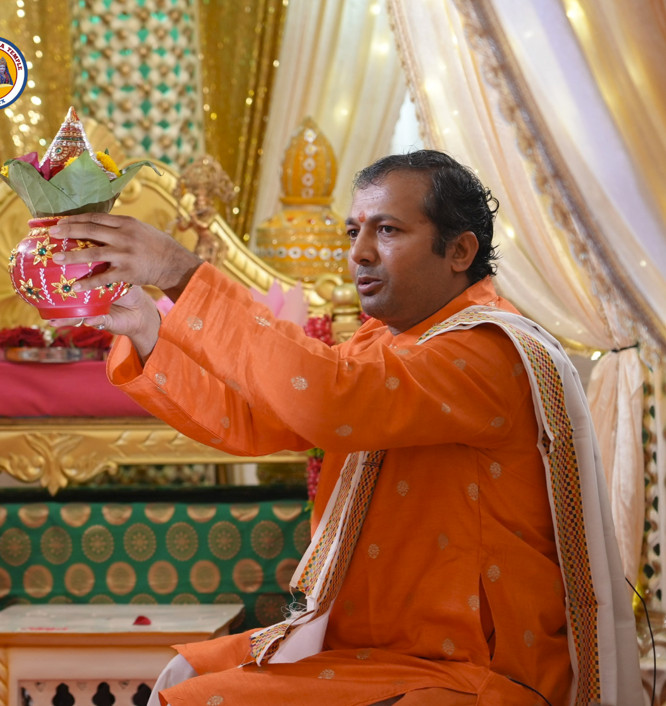Welcome to the November 2023 issue!

Welcome to the November 2023 issue!
 Quote
Quote
गृहेष्वाविशतां चापि पुंसां कुशलकर्मणाम् ।
gṛiheṣhv āviśhatāṁ chāpi puṁsāṁ kuśhala-karmaṇām
(Shreemad Bhāgavatam Puran 4.30.19)
“Those who know the Supreme Lord to be the enjoyer of all activities, perform all their works, including their household duties, as yajña to the Lord.”
 From the Editor's Desk
From the Editor's Desk
Longing for happiness and joy, we constantly focus on enhancing and sharpening our academic, artistic, or other skills. However, we tend to overlook the need to enhance ourselves and our thought processes. Carried away by material tendencies, we forget that merely upgrading such skills inflates the ego, culminating in a life devoid of purity and joy.
“While performing one’s duties in the world, a person should slowly learn to rise above anger, greed, and desire,” explains Swami Mukundananda. We can do so only when we perform our work consciously instead of compulsively or impulsively.
So, let’s focus on the question at hand: How do we work consciously to consecrate our every endeavor?
 Bhakti Ras
Bhakti RasConsecrate Every Action
Shreemad Bhagavatam says:
न हि कश्चित्क्षणमपि जातु तिष्ठत्यकर्मकृत् ।
कार्यते ह्यवश: कर्म गुणै: स्वाभाविकैर्बलात् ॥
na hi kaścit kṣaṇam api jātu tiṣṭhaty akarma-kṛt
kāryate hy avaśaḥ karma guṇaiḥ svābhāvikair balāt
(6.1.53)
“Nobody can remain inactive for even a moment. Everyone is forced to act by their modes of material nature (i.e. the three gunas.)”
Actions do not mean merely professional work but all activities such as eating, drinking, sleeping, waking, and thinking. In short, all tasks performed with the body, mind, and tongue are actions. Therefore, none can refrain from doing anything, not even momentarily.
While some go about their work consciously, others perform unmindfully or ignorantly. Such ignorant individuals are carried away by the waves of Maya, the material energy that manifests in several facades – wealth, fame, position, prowess, kinsfolk, or social affinity. Maya clasps such souls under the sway of desire, anger, greed, pride, etc. On the other hand, those who perform actions consciously (as an impartial observer) turn their mind away from worldly attractions, which results in trikarana shuddhi – purity of thoughts, words, and deeds. Such purity is accomplished only when one performs works in God-consciousness. How can we accomplish this?
Thoughts - Think Nobly
We believe that actions speak louder than words. However, the intention or motivation behind every action ascertains its purity or immaculacy.

People around us may not have the faintest idea of our intentions. Conversely, the Paramātmā (the Supreme Soul residing in the heart of all living beings) perceives and notes all our thoughts and motivations. Elevated souls conscious of this supreme relation with Paramātmā are mindful of God’s perpetual indwelling.
Saint Purandara Dās was one such elevated soul. Once, when his guru asked him to eat a banana without the knowledge of anyone, Saint Purandar Dās responded, “Guru ji, I can’t find a place or a soul where God doesn’t exist.” His guru was pleased and blessed him.
It is essential to constantly keep ourselves aware of Paramatma and nurture virtuous thoughts. In other words, we must make it a habit to be in true satsang. Satsang is not limited to weekend visits to the temple. To be in satsang simply means to be in the company of rich, noble, and uplifting thoughts all the time. To achieve this, we must turn towards God, who is pure in every sense. Therefore, as Shree Krishna instructs, sarveṣhu kāleṣhu yoga yukto bhava “at all times be situated in Yog (union with God).”
Words – Speak Wholesomely
Words that inspire and uplift those around us spring from pure intentions. It's natural to wonder how we can know if our intentions are pure. “Our soul intimates us of it. When our intention is pure, we get divine bliss from within, and we experience inner joy,” elucidates Swami Mukundananda. When we have noble intentions, we will always choose to speak in a constructive, thought-provoking, and valuable way. Therefore, along with the austerity of mind, we must practice the austerity of speech:
अनुद्वेगकरं वाक्यं सत्यं प्रियहितं च यत् |
स्वाध्यायाभ्यसनं चैव वाङ्मयं तप उच्यते ||
anudvega-karaṁ vākyaṁ satyaṁ priya-hitaṁ cha yat
svādhyāyābhyasanaṁ chaiva vāṅ-mayaṁ tapa uchyate
“Words that do not cause distress, are truthful, inoffensive, and beneficial, as well as the regular recitation of the Vedic scriptures—these are declared as the austerity of speech.”
Shree Krishna proclaims that one who practices these austerities of speech is a vāk tapasvi (speech ascetic).
Deeds – Perform Consciously
When we defer to the Lord in thoughts and words, our deeds align with his will. We naturally refrain from self-centered behavior and begin to see the entire world as belonging to God, and hence meant for his satisfaction. This heightened awareness of God’s omnipresence helps us practice dispassion towards the world and deepen our devotion to him.
Dispassion or detachment from the world doesn’t mean we abandon our responsibilities. We should continue to perform our worldly duties while reposing the mind and body in God alone. We need to practice dedicating our thoughts, words, and actions to him with love and devotion. Remember that the Supreme Lord doesn't need anything from us, as he is the one who has blessed us with our abilities for our own benefit. We can either consecrate our abilities and efforts by serving the Lord or sully the same by serving Maya.
When we embark on the spiritual path, we must be even more vigilant with our intentions. If we engage in spiritual activities to achieve riches, recognition, glorification, veneration, or other material rewards, then those activities are also alloyed. Hence, Chaitanya Mahaprabhu pleads with the Lord to help him stay focused on serving him selflessly:
न धनं न जनं न सुन्दरीम् कवितां वा जगदीश कामये |
मम जन्मनि ईश्वरे भवताद् भक्तिः अहैतुकी त्वयि ||
na dhanam na janam na sundarīm kavitām vā jagadīsh kāmaye
mama janmani īshvare bhavatād bhaktir ahaitukī tvayi
(Shikshāshtakam)
"O Lord of the Universe, I don't desire wealth, followers, beautiful women, or poetic rhetoric. My only wish is to have selfless devotion to you, birth after birth."
Thus, when we practice these three-fold austerities with God as our supreme goal and refuge, every effort or work is automatically consecrated. This means working in God-consciousness, which manifests divine grace within our hearts.
 Bal-Mukund: Playground for Vedic Wisdom
Bal-Mukund: Playground for Vedic Wisdom
An offering leading to God’s manifestation

Dhanna Jaat was an illiterate person who used to help in a temple daily. He was growing old and knew that the number of his days was limited. He requested the Panditji (i.e., a priest) to teach him how to worship God. Since Dhanna did not know any Vedic prayers, the Panditji took a stone grinder and gave it to him saying that it was a Shaligram (i.e., a fossilized stone form of God).
He instructed Dhanna to conduct daily activities of bathing, decorating, and offering meals to the Shaligram. Dhanna took the stone home and was happy thinking that God was now present in his house.
The next day he followed the Panditji’s instructions to bathe and decorate the Shaligram. Since he was a poor man, he only had two rotis (i.e., whole wheat flatbread) to eat.
Dhanna offered one to God, but God did not eat it.
Thinking that God was hungrier, he offered the second one too. He felt that God may have not been in the mood to eat and so he refused to eat himself until God ate the rotis. Dhanna did not eat for the next seven days. God melted seeing how Dhanna had created divine sentiments through a stone and manifested through the stone in a human form.
God ate the first roti and when he went to eat the second one, Dhanna claimed it for himself, as he had also been hungry for seven.
God put his hand on Dhanna’s head and blessed him such that the knowledge of all the Vedic scriptures was revealed to him and divine love was received in his heart.
Such was the power of consecrating every action by offering daily service to God.

Practical Wisdom:
- Dhanna was blessed by God. He had purified himself by creating divine sentiments and offering daily activities towards a stone that he believed was God. God is sitting in everyone’s heart. God rewards us based on the sentiments in our actions.
- Dhanna wanted to start worshiping God as he was getting older. His method of worship involved conducting selfless seva (service). Seva is the dharma of the soul.
 Youth Insights
Youth Insights
Youth Insights – 1 of 2
Consecrating our actions to the divine is a way we can experience fulfillment and happiness in mundane tasks. The idea of “consecrating every work” means recognizing our duties and doing them selflessly as an offering to God.
This can be done through Karm Yog, a spiritual task, where everything becomes a ritual, yagna, or a sacred sacrifice to God. Karm Yog emphasizes the significance of dedicating every action to the divine and detaching oneself from personal desires.
Personally, I noticed the effects of consecrating work when I was doing a spiritual service even when I had work at home. I focused my thoughts on the task at hand and connected the tasks to God, instead of thinking about the amount of work I had at home. When I did this, I felt a sense of peace and happiness. In contrast, when I did tasks without the thought of God, the experience felt hollow. There is a lack of fulfillment even upon achievement if the action is not consecrated to God
Therefore, we can consecrate our work by doing all of our tasks with devotion or God in mind. Fulfilling our duties is part of a cyclical action with spiritual benefits. In order to derive these benefits, I have tried to perform the actions in the name of God. This sacrifice is also known as yagna. In JKYog's e-Journal Samarpan, the topic of Karm Yog (https://www.jkyog.org/eJournal-Karm-Yog) talks about how “Karm Yog is the path of attaining God while doing one’s karm.” In this way, we get the physical, mental, and spiritual benefits of our work.
In conclusion, consecrating our actions to God through Karm Yog not only fulfills our duties but also gives many benefits, providing a sense of fulfillment and purpose that transcends everyday life. I will focus on thinking about how I can consecrate work in my own life everyday.
Youth Insights – 2 of 2

As young individuals navigating the modern world, consecration is a call to infuse our daily actions with a sense of sacred purpose. It means acknowledging that every pursuit, big or small, can be a heartfelt offering to the divine. The Bhagavad Gita implores us to act selflessly without getting attached to outcomes. Let’s see how we can apply this in our daily lives
 Holistic Health Titbits
Holistic Health TitbitsDedicate Your Health To God
The origin of the word consecration comes from the Latin stem ‘consecrat,’ which means “dedicated, devoted, and sacred.” The question becomes: how can our health be considered sacred and dedicated to God? In simple terms, the answer is: if we can transfer our mindset towards health from the material world to the sacred sphere, then we can truly understand that it has a special purpose in our service and unconditional surrender to God.
Swamiji asks us to be mindful, focused, and committed to excellence. To consecrate all works, we must also include physical and mental well-being in our calculus. By approaching our health with the same sense of purpose, commitment, and reverence that we do with sadhana, Satsang, and seva, we will strengthen our bond with the Lord.
“The warfare against self is the greatest battle that was ever fought. The yielding of self, surrendering all to the will of God, requires a struggle; but the soul must submit to God before it can be renewed in holiness.” - Ellen G. White.
Practical Ways to Consecrate Our Work
Daily yoga, meditation, pranayam, proper diet and rest, and stress reduction create an environment for auspiciousness. We can develop a daily routine for dedicating these actions to God. For example, we can start our yoga practice with a prayer and dedication to God to do our best. Prepare a healthy meal and speak the sentiment of service we are offering to the Lord by maintaining a healthy body. Chant divine names upon every breath (inhale and exhale). Imagine Shree Krishna watching and cheering us on as we push ourselves to take an extra lap in the pool or around the track. Remember to remain detached from the results and only focus on the work.
Ultimately, we will receive God’s grace in the form of good health when we do these things. Indeed, our body is the vehicle to take us to God. “When I walk, I think I am circumambulating the Lord; when I work, I think I am serving the Lord; and when I sleep, I think I am offering him obeisance. In this manner, I perform no activity other than that which is offered to him.” - Saint Kabir

 Reflection Questions for Discussion
Reflection Questions for DiscussionBhakti Ras / Inspiration
Bal-Mukund: Playground for Vedic Wisdom
Youth Insights
Holistic Health Titbits
 Upcoming Events
Upcoming Events
The Radha Krishna Temple of Dallas (Allen) brings you the most exciting divine wedding of the year! Mark your calendar to not miss this celebration that will fill your heart with joy! Join us to experience fun festivities and devotion on this occasion.
JKYogand Radha Krishna Temple invite you to the grand Tulsi Vivah celebration next month.



It is said that in Golok, where Lord Krishna and Radha Rani perform their eternal pastimes, also resides a divine personality by the name of Vrinda Devi. An eternal associate of Radha Rani, Vrinda Devi makes sure that the divine pastimes of Shree Krishna and Radha Rani take place for the eternal welfare of souls. Tulsi Devi is believed to be an expansion of Vrinda Devi. Join us to know the story of how Vrinda Devi happened to marry Shaligram – a form of Shree Krishna.
Participate in the grand 2-day Tulsi Vivah celebrations to experience the joy of a real wedding including events like Mehendi, Haldi, Sangeet baarat (i.e., wedding procession), and the pheras (i.e., circles around the sacred fire). Each and every ritual will fill your heart with love.
What: Tulsi Vivah – the Grand Wedding of Shaligram with Tulsi Devi
When: December 1 and 2, 2023
Where: Radha Krishna Temple, 1450 N Watters Rd, Allen, TX 75013
Details: https://www.radhakrishnatemple.net/tulsi-vivah
Catch some glimpses from a previous celebration of this festival. We look forward to seeing you on this auspicious occasion.
Please visit our website if you are interested in Seva opportunities (US and India).

About Us
This magnificent Hindu temple is the serene abode of Shree Radha Krishna where you imbibe the nectar of love for God, celebrate festivals with the Indian community in Dallas, practice meditation and yoga, enrich your children’s lives with Vedic culture, or simply relax and enjoy the spiritual environment with your family.
Non Profit 501(c)(3)organization.
Federal tax ID:26-3490578.
Location
1450 N. Watters Road, Allen, TX 75013 (Dallas–Fort Worth Metroplex)
Phone: (469) 795-9130
Get Updates
Subscribe to our newsletter









